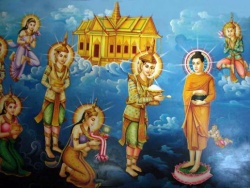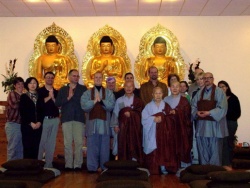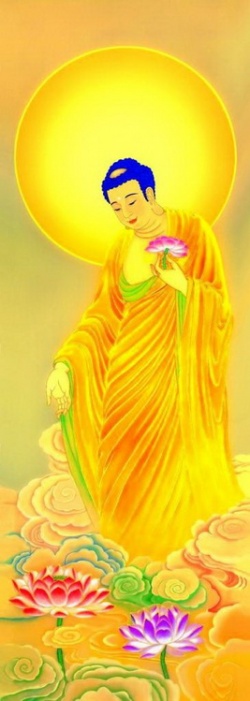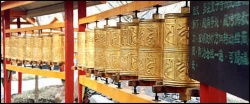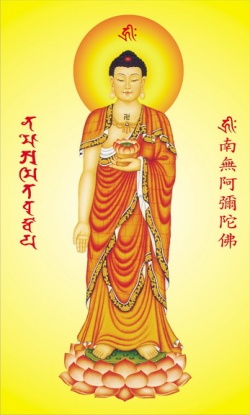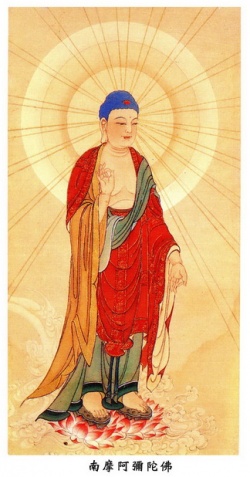The Buddhist Prophecy
Extracted from book: Muhammad in Buddhist Scriptures
A. H. Vidyarthi and U. Ali
(From the Burmese source.s.)
The Buddha said to Sariputta:-
"......................... Our cycle is a happy one. Three leaders have already lived. Kakusandha, Konogamana And eke the leader Kasapa. The Buddha supreme am I. But after me Metteya comes. While still this happy cycle lasts, Before its tale of years shall lapse This Buddha then Metteya. called Supreme, and of all men the chief"
Buddhism in Translation by Warren. PP 481 -2.
(From Ceylon Sources.)
Ananda "said to the Blessed One.
'Who shall teach us when thou art gone?"'
And the Blessed One replied:-
'I am not the first Buddha who came upon the earth, nor shall I be the last. In due time anothr Buddha will arise in the world, a holy one, a supremely enlightened one, endowed with wisdom in conduct, auspicious, knowing the universe, an incomparable leader of men, a master of angels and mortals. He will reveal to you the same eternal truths which I have taught you. He will preach his religion, glorious in its origin, glorious at the climax, and, glorious at the goal. He will proclaim a religious life, wholly perfect a pure, such as I now proclaim. His disciples will number many thousand, while mine number many hundred.'
Ananda said, 'How shall we know him?'
The Blessed One replied, 'He will be known Maitreya.......................'
The Gospel of Buddha by Carus. PP. 217-8
OR
The Buddha said:-
"Monks. in the days when men live 80000 years, there will arise in the world a Buddha named Metteyyo (the benevolent one), a holy one (Arahat), a supremely enlightened one, endowed with wisdom in conduct; auspicious, knowing the universe, an incomparable charioteer of men who are tamed; a master of and mortals; a Blessed Buddha; even as I now have arisen in the world, a Buddha with these same qualities endowed. What he has realised by his own supernal knowledge he will publish to this universe with its angels, its fiends, and its archangels, and to the race of philosophers and brahmins, princes and peoples; even as I now having all this knowledge do publish the same unto the same. He will preach his religion, glorious in its origin, glorious at the climax, glorious at the goal, in the spirit and the letter. He will proclaim a religious life wholly perfect and thoroughly pure, even as I now preach my religion, and a like life do proclaim. He will keep up a society numbering many chousand. even as I now keep up a society of monks numbering many hundred."
Buddhist and Christian Gospes by Edmunds. Vol II. PP. 160-1.
OR
"At that period, brethren, there will arise in the world an Exalted One named Metteya, Arahant, fully Awakened, abounding in wisdom and goodness, happy, with knowledge of the worlds, unsurpassed as a guide to mortals willing to be led, a teacher for gods and men, an Exalted One, a Buddha even as I am now. He, by himself, will thoroughly see and know, as it were face to face, this universe, with its world of the spirits, its Brahamas, and its Maras, and its world of recluses and Brahmins, of princes and peoples, even as I now by myself, thoroughly know and see them. The truth (the Norm) lovely in its origin, lovely in its progress, lovely in its consummation, will he proclaim, both in the spirit and in the letter; the higher life will he make known, in all its fulness and all its purity, even as I do now. He will be accompanied by a congregation of some thousands of brethren, even as I am now accompanied by a congregation of some hundreds of brethren.
Cakkavatti-Sihanada Suttanta. The Mahabodhdi Society Translation.
(From the Chinese-Sanskrit sources.)
"In the old days when the Tathagata was living at Rajagriha (Wang-she), on the Gridhra-kuta(others think at "Benares") mountain, he spoke thus to the Bhikshus: 'In future years, when this country of Jambudvipa shall be at peace and rest, and the age of men shall amount to 80000 years, there shall be a Brahman called Maitreya (Sse-che). His body shall be of pure gold, bright, glistening and pure. Leaving his home he shall become a perfect Buddha, and preach the threefold("Thrice repeated") Law for the benefit of all creatures. Those who shall be saved are those who live, in whom the roots of merit have been planted through my bequeathed Law. These all conceiving their minds in profound respect for three precious objects of worship, whether they be already professed disciples or not, whether they be obedient to the precepts or not, will be led by the converting power (of his preaching) to acquire the fruit (of Bodhi) and final deliverance. Whilst declaring the threefold Law for the conversion of those who have been influenced by my bequeathed Law, by this means also hereafter others will be converted."
Si-Yu-Ki. Vol. 2. Pp. 46-7.
(From the Tibetan sources)
"It is said up to the time when Phanchhen-rinpochhe (The Great Jewel of Wisdom) condescends to be reborn in the land of the P'helings (Westerners) and appearing as the Spiritual Conqueror (Chom-den-da), destroys the error and ignorance of ages, it will be of little use to try to uproot the misconceptions of P'heling-pa (Europe); her sons will listen to none."
The Secret Doctrine by Blavatsky. Vol. III. P. 412.
From the above it is clear that the Buddha Gautama foretold the advent of a person named Maitreya, or Metteyya as his successor.
IDENTIFICATION OF MAITREYA.
I.
Some Buddhists consider that the Buddha Maitreya has appeared (Studies in Japanese Buddhism by Reischaner. P. 264.):
1. "Wu, the mother of the sixth emperor of the T'ang dynasty in China, was presented a Sutra named 'Ta-yun-king, in the year 690. 'It stated that she was Maitreya, the Buddha that was to come'." (Chinese Buddhism by J. Edkins. P. 122.)
2. Kings, Yeula and Vijayavirya, were supposed as incarnations of "Bodhisattva Maitreya." (Life of Buddha by Rockhill. PP. 237-8.)
3. The Burmese monk, Ledi Sayadaw, "has been proclaiming far and wide the near coming of Bodhisattva Maitreya, who, he says, has left the Tusita Heaven, and was in 1914. A. D. on earth as a boy." (The Coming World Teacher by P. Parki, P. 52.)
In the past(Si-Yu.Ki by Beal. V.I. P.226.) as well as in the present(Buddhism and Buddhists in China by Hodous. P.38), Buddhists have pretended to receive written books of revelation, from Maitreya. They have even imagined him to come down from heaven for making the image of the Buddha Gautama(Si-Yu-Ki Vol.II. PP.121-2.).
The above claims have not received the serious attention of the Buddhist world and therefore need comment on our part. The Buddhists. like some of the Theosophists, await the advent of Maitreya in future. The Buddhists all over the world have build images of Maitreya, sometimes as high as 70 feet or more (Hodous PP. 120-1). The European traveller well knows the "Laughing Buddha" Maitreya of the Chinese (Ibid PP. 20-1).
II
WAS SHANKARACHARYA THE BUDDHA MAITREYA?
Some Brahmans consider the Buddha Gautama as the 9th Avatar of Vishnu (The Essence of Buddhism by L Narasu. P. 27 Foot Note). Some Brahmans a1ong with the Theosophists consider that Shankaracharya was the expected Maitreya:-
"Esoteric teaching is to the effect that Shankaracharya was a Buddha in all respects, in a new body........ I have received the information I am now giving from a Brahman Adwaiti, of Southern India- not directly from the Tibetan instructor.........Some of the later incarnations of Buddha are described differently as overshadowings by the SPIRIT OF BUDDHA, but in person of Shankaracharya he reappeared on earth. The object he had in view was to fill up some gaps and repair certain errors in his own previous teachings; for there is no contention in the esoteric Buddhism that even a Buddha can be absolutely infalliable at every moment of his career....." (Esoteric Buddhism by A.P.Sennett. P.149)
Shankaracharya cannot be the Buddha Maitreya, for:
1. he never gave out in his life time that he was the Buddha Maitreya;
2. his life, as will appear later on, does not display the "TEN PERFECTIONS" (Warren PP. 22-37), a necessary possession for a FULLY ENLIGHTENED BUDDHA;
3. he took up the cause of the Vedas (Satyarath Prakash by Mool Shankar PP.415-16) against the Buddhists. Shankaracharya writes: -
(a) "The Veda.s are the highest authority" (Sankaras Select Works, by S. Vankataramanan P. 205)
(b) "There is no authority for knowledge, equal to the Veda." (Ibid P. 206.)
Some oriental and occidental scholars and the Buddhist divines consider that the Buddha Gautama made light of the Vedas: -
(a) "Empty, forsooth, are these Vedas, and as chaff. There is in them neither reality, nor worth nor essential truth". (S. B. E. Vol. XXV. P. 18.) - Nagasena
(b) Pt. Mool Shanker, more commonly known as Dayananda Saraswati, the founder of Arya Samaj, the modern Protestant Hinduism, considers Buddhism "a strong and fearful Veda and Shastra denouncing" religion (Satyarath Prakash P. 414.)
(c) "Buddha discredited the sacrificial system; he censured with bitter irony the knowledge of the Vedic scribes as sheer folly." (Buddha P. 172.) - Oldenberg
(d) The Buddha Gautama "Scoffed at the Vedas." (Asoka P. 35.) - Macphail
This view is supported by numerous sayings of Sakya Muni:-
(a) "Reading the Vedas, making of offerings to priests, or sacrifices to the gods, self-mortification by heat or cold, and many such like penances performed for the sake of immortality, these do not cleanse the man, not free from delusions." (Buddhism by Rhys Davids. P. 131.) - Amagandh( Sutt)
(b) "Therefore the threefold wisdom of the Brahmans, wise in the three Vedas, is called a waterless desert, their threefold wisdom is called a pathless jungle, their threefold wisdom is called destruction." (S.B.E,VoLX1. P.185.)
(c) "Of no value are the Vedas." (Silavimansa quoted in Early History of the Spread of Buddhism and the Buddhist Schools by N. Dut. P. 13.)
(d) "These Veda studies are the wise-acre's toils, The lure which tempts the victims whom he spoils. A mirage formed to catch the careless eye, But which the prudent passes safely by, The Vedas have no hidden power to save, The traitor or the coward or the knave. The Brahmans all a livelihood require, And so for their gain they made the Vedas. Full of sentences in metric forms, Learned by rote and not easily forgot. Their obscurity but tempts the foolish mind. Which swallows all 'tis told with impulses blind. Doctrines and rules, absurd, concocted, and vain, Coolly imagining wealth and power to gain,................ These greedy liars propagate deceit. And fools believe the fiction they repeat." (L. Narasu. PP. 129-30.) - BHURIDATTA JATAKA.
Shankaracharya did not give it out in his lifetime that he was a Buddhist and a reformer of Buddhism. He was one of those who were antagonistic to Buddhism and succeeded in destroying or driving it out from India. (Shankaracharya by Sita Nath Datta.)
Some more reasons we shall give later on.
III
WAS JESUS THE BUDDHA MAITREYA?
For sometime past some learned men of East and West have been advertising that Jesus was the Buddha Maitreya:-
(1) "Will the Buddhists ever learn that this Buddha of the future, this Maitreya, this teacher of love, and not of the law, has appeared ?" (Chips from a German Workshop. Vol. 1. PP. 452-3.) - Max Muller
(2) "The Christ Metteyyo is yet to come." (The Buddhist and the Christian Gospels. Vol. 2. P. 164.)- Edmunds,
(3) "In later day we know them as Gautama and Maitreya, Buddha and Christ." (Buddha and Christ. P. 8.) - C. Jinarajadasa.
(4) "Maitreya and Christ are one." (The Coming Christ P. 106.) - Johanna.
(5) "Lord Maitreya, on the other hand, when he appeared as the Christ, exhorted his disciples, 'Love one another as I have loved you.'" (The Coming wor1d Teacher. P. 23.) - P. Pavri
(6) "Lord Maitreya took the same course when He visited Palestine 2,000 years ago." (The Masters and the Path. P. 51.) - Leadbeater.
(7) "Blavatsky maintains that Jesus shall be Maitreya in his second advent which is yet to take place.' (Isis Unveiled. Vol. II. P. 156. Foot Note.)
We shall refute this view at length, but here only in brief:-
(1) From the study of the four Gospels we can say that Jesus in his lifetime never gave it out that he was the Buddha Maitreya.
(2) The character of Jesus does not display "TEN PERFECTIONS" We shall discuss this in details.
(3) The cardinal doctrine of [[Wikipedia:Christianity|Christianity]] is that Jesus was "betrayed" into the hands of his enemies who hanged him, and he died upon the cross. The four Gospels are unanimous on the point (Matt. 27: 27; Mark F5: 37; Lu 23: 46; John P 1: 30.). Even Jesus is made to testify to this view (Luke 23:43). The Christian world must abandon this doctrine first before the Buddhists can consider the advertised claim for being the Buddha Maitreya, for the Buddha Gautama said: -
"This, O Bhikkhus, is an impossible thing, one that cannot occur that one should deprive a Tathagata of life by violence. The Tathagatas, O Bhikkhus. are extinguished (in death) in due and natural course (Vinaya Text by Max Muller Part III. PP. 246-7.)".
The view of Blavatsky that Jesus shall be Maitreya in his second advent, is untenable. If Jesus at all returns to the world again, he cannot put forward the claim of being this Maitreya for,
(a) "The same Jesus"(Acts 1:11), "the Lord himself shall descend from heaven"(I Thes.4:16), "coming in the clouds of heaven with great power and glory."(Matt. 24: 30). Contrary to this the Buddhist prophecy demands that this Maitreya must be born on earth (THE LIFE AND TEACHINGS OF BUDDHA by A. Dharampal P. 82) and of human parents who must be different from Joseph and Mary. (M. B. J. May and June 1928. P. 280.)
(b) "Christ being raised from the dead dieth no more; death bath no more dominion over him," (Romans. 6: 9; Matt. 28: 20) whereas according to the 'Buddhist prophecy Maitreya Buddha must die in due course of time (Warren P. 485; Maitreya Samiti by Laumann Vol. 1. P. 22).
Hence neither the 'Christian nor the Buddhist scriptures support the view of Blavatsky that Jesus shall be Maitreya Buddha in his second advent. And "the scripture can not be bróken." (John. 10: 35.)
IV
EQUIVALENTS OF MAITREYA
The person whose advent the Buddha Gautama prophesied bears different names in different languages. In Pali his name is Metteyya, in Sanskrit, Maitreya, in Burmese, "Aremideia" (THE LEGEND OF GAUDAMA by Bigandet. Vol. I. P. 11. Foot Note.), in Chinese, "Mei-ta-li-ye" (Si-Yu-Ki Vol. 1. P. XXIX), or "Milie Pusa" (BUDDHIST CHINA by Johnston P. 367.), or "Mili Fo" (Edkins P.208), or "Tzushih" (Yuan Chwang Vol. I. P. 239 by T. Watters), in Tibetan, "Byams-pa" (Pr. 'Jampa' or 'Champa' Lamaism by Waddell P.355) or "Mahitreja" (THE RELIGION OF TIBET AND THE TRUE RELIGION by Frauson P. 38), and in Japanese, "Miroku." (Reischauer PP. 264-5.)
The English equivalent of Metteyya: -
(1) "Teacher of love." - Max Muller (CHIPS FROM A GERMAN WORKSHOP. Vol. I. P. 452).
(2) "Lord of love." - A Dharampal (THE LiFE AND TEACHINGS OF BUDDHA. P.83).
(3) "He whose name is kindness" - Carus (THE GOSPEL OF BUDDHA. P. 218.).
(4)"Buddha of kindness" - Rhys Davids (BUDDHISM. P. 180).
(5)"Universal love," or "Benevolence." - L. Narasu (ESSENCE OF BUDDHISM. P. 101; 105).
(6) "Buddha of brotherly love." - Lillie (BUDDHISM IN CHRISTENDOM. P. VII).
(7) Buddha of "Friendliness." - Fausboll (SUTTA NIPATA. P. 205).
(8) "Loving and compassionate." - Monier Williams. (BUDDHISM. P. 181.)
(9) "Love or mercifulness." - S. Beal (THE CHINESE DHAMMAPADA. P. 69.)
(10) "Compassionate" or of "Family of mercy" - Getty (GODS OF NORTHERN BUDDHISM. P. 20;68).
(11) "The merciful." - Herbert Baynes (THE WAY OF BUDDHA. P. 15).
(12) "Merciful one." - Joseph Edkins (CHINESE BUDDHISM. P. 240).
(13) "Quality of a friend; friendly; benevolent; kind; love, amity, sympathy, active interest in others." - William Steade (THE PALl DICTIONARY).
RAHMAT IS THE ARABIC EQUIVALENT 0F MAITREYA. Benevolence, loving kindness, friendliness, compassion, mercy or mercifulness, all words of similar import are all expressed by the Arabic word Rahmat. The Arabic English lexicon by Edward William Lane gives some of the following equivalents of Rahmat:- "Mercy, pity, compassion, tenderness of heart; inclination requiring the exercise of favour, and beneficence; pardon and forgiveness."
Badger's English Arabic Lexicon includes "Goodness and providence".
"Ar-Rahman and Ar-Rahim are both derived from Rahmat, signifying tenderness requiring the exercise of beneficience (Raghib Imam) and thus comprising the idea of love and mercy. Ar-Rahman and Ar-Rahim are both active participle nouns of different measures. denoting intensiveness of significance, the former being of the measure fa'lan, and indicating the greatest preponderance of the quality of mercy, and the latter being of the measure fa'il and being expressive of a constant repetition and manifestation of the ahribute. (A. H.) The two words have been explained by the holy prophet himself. He is reported to have said. 'Ar-Rahman is the Beneficent God whose love and mercy are manifested in the creation of this world, and Ar-Rahim is the Merciful God whose love and mercy are manifested in the state that comes after'. (A . H.) i.e., in the consequence of the deeds of men. Thus the attribute of mercy in Ar-Rahman is manifested before man comes in existence in the creation of things that are necessary for his life here, and therefore without his having deserved them, while the same attribute in Ar-Rahim is manifested when man has done something to deserve it. Thus the former is expressive of the utmost degree of the love and generosity, the latter of unbounded and constant favour and mercy. Lexicologists agree in holding that the former includes both the believer and the unbeliever for its object, while the latter particularises more the believer. (LL. R. gh. L.A. T.A.) Hence I render Ar-Rahman as meaning the Beneficient God because the idea of doing good is predominent in it, though I must admit that the English language lacks an equivalent of Ar-Rahman even making an approach to giving expression to all comprehensive love and goodness manifested in that word......" (Mohammed Ali's translation of the Koran, Foot Note 3.)
Metteyya is from Metta. The Metta Sutta runs thus:- "As a mother at the risk of her life watches over her own child, so let every one cultivate a boundless friend (friendly) mind towards all beings." (The Maha Bodhi Society translation.)
"The Merciful......it expresses the universal atiribute of mercy which the Almighty extends to all men, the wicked and the good, believers and the un-believers. This is a noble thought." (The Muslim Doctrine of God by S.M.Zwemer D.D. PP. 35-6.)
Thus Rahmat fully expresses the significauce of the word Metteyya. Sale translates Rahmat as "Mercy." (The Koran. Chapter 2l P.326.)
